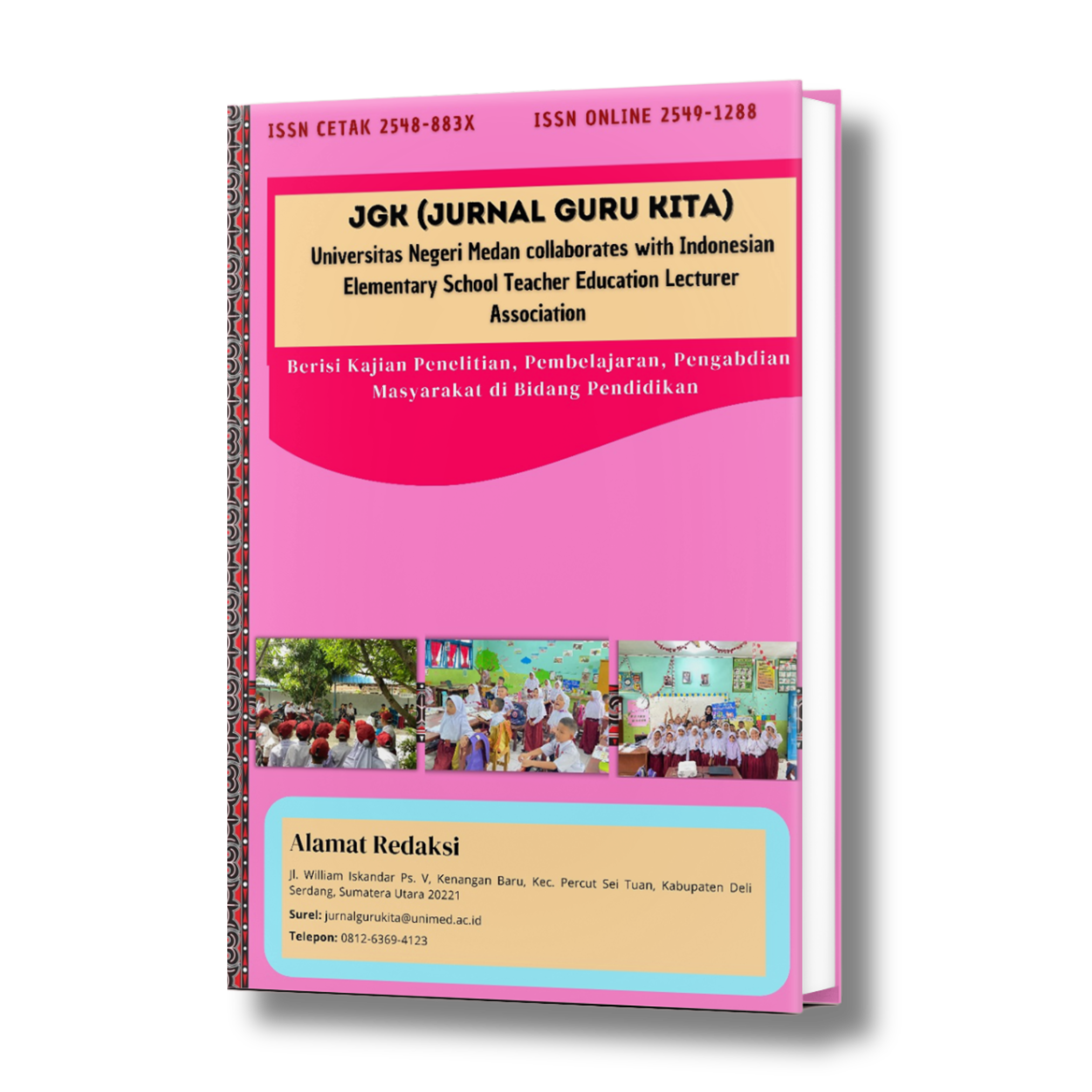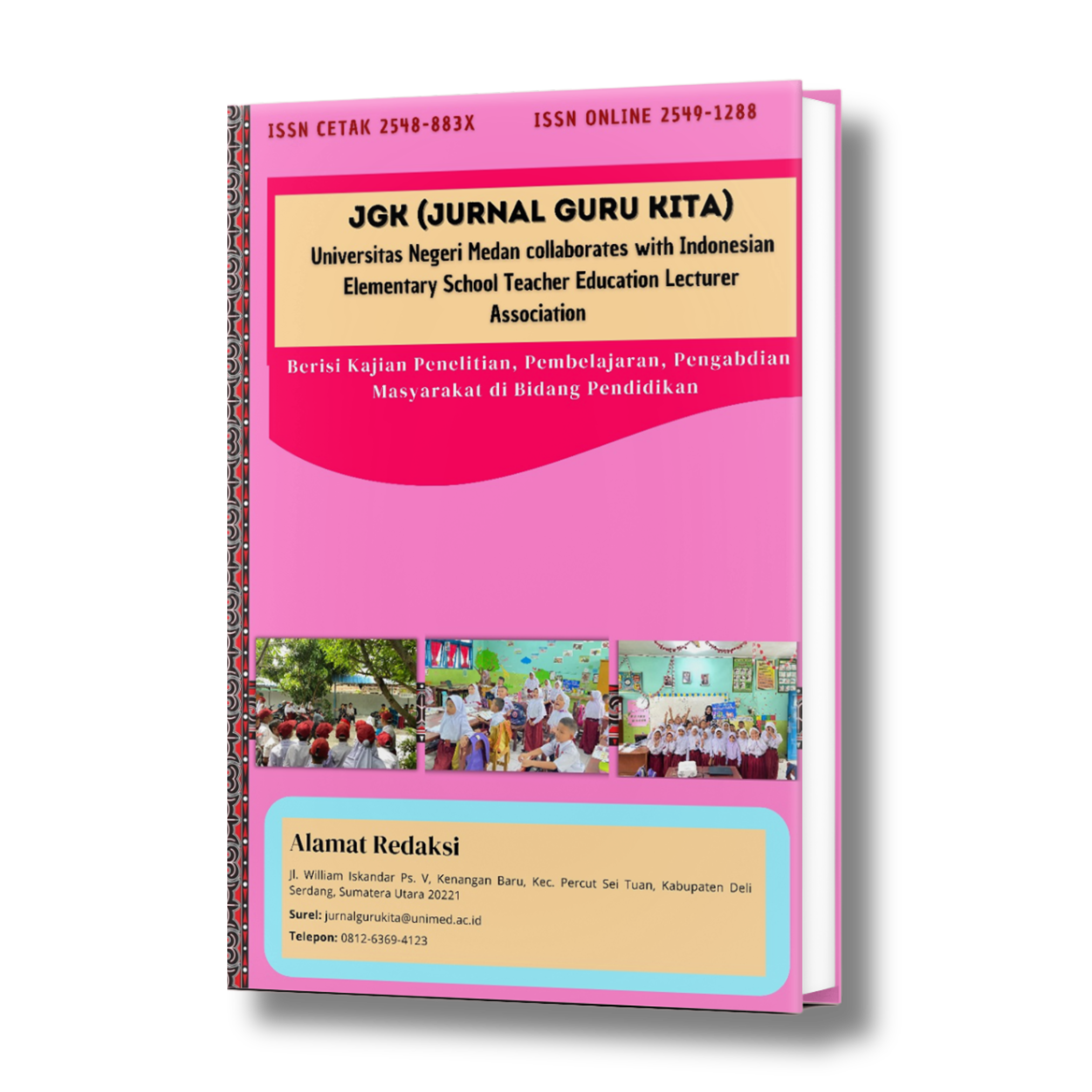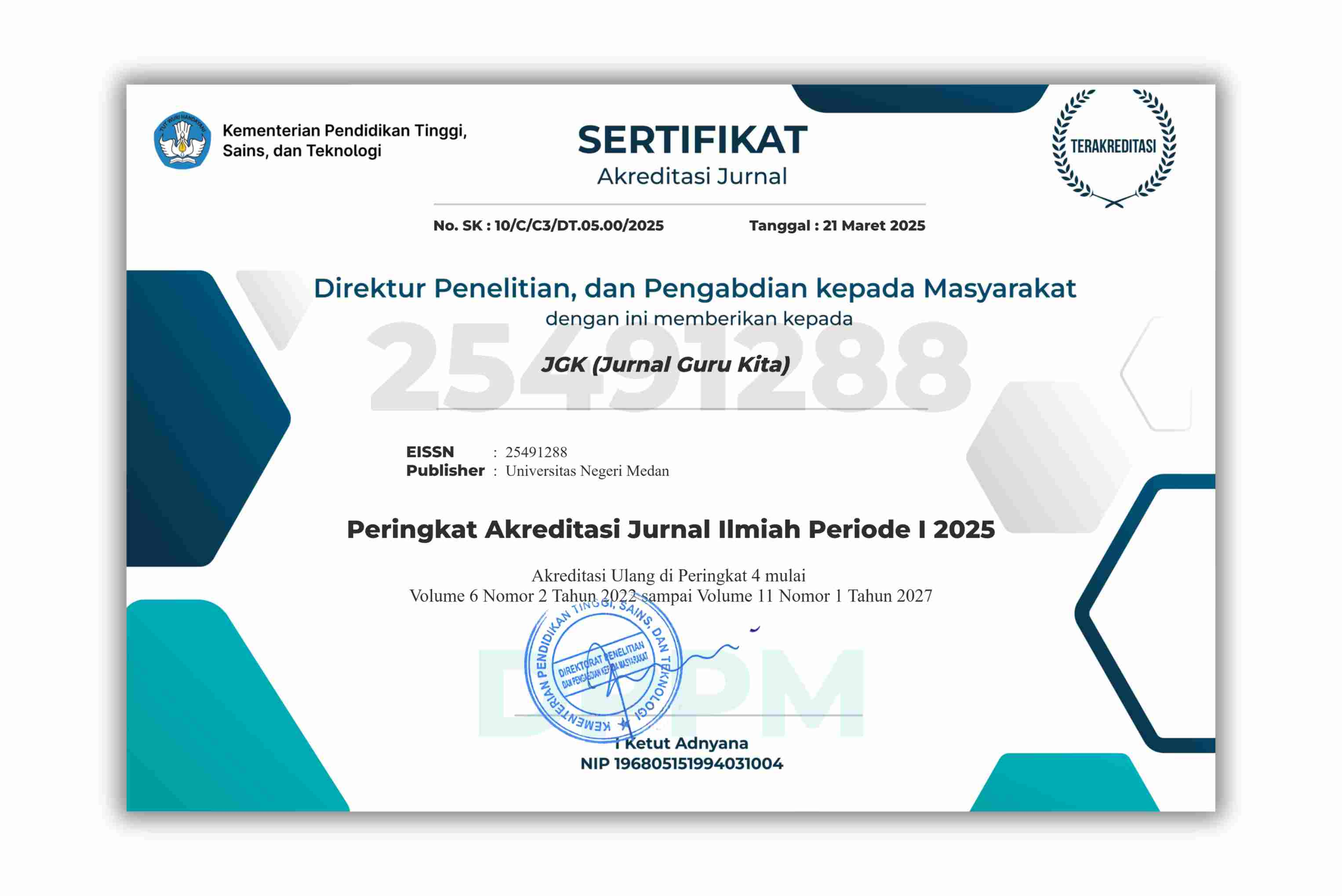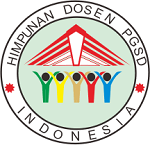Korelasi antara Prinsip Pembelajaran Kolaboratif dengan Motivasi Belajar Pada Siswa Sekolah Dasar
DOI:
https://doi.org/10.24114/jgk.v9i4.65745Keywords:
Pembelajaran Kolaboratif, Motivasi Belajar, Interaksi Sosial, Pendidikan Abad ke-21Abstract
Pembelajaran kolaboratif merupakan pendekatan strategis yang menekankan kerja sama aktif antar siswa dalam kelompok kecil guna mencapai tujuan pembelajaran bersama. Penelitian ini bertujuan untuk mengkaji konsep dasar, manfaat, serta hubungan antara pembelajaran kolaboratif dan motivasi belajar siswa sekolah dasar. Melalui studi literatur, ditemukan bahwa pembelajaran kolaboratif mampu meningkatkan partisipasi aktif, keterampilan sosial, kemampuan berpikir kritis, serta memberikan pengalaman belajar yang lebih bermakna. Motivasi belajar siswa sendiri dipengaruhi oleh faktor internal dan eksternal, termasuk kondisi psikologis, dukungan sosial, dan lingkungan belajar. Hasil kajian menunjukkan adanya hubungan positif antara pembelajaran kolaboratif dan peningkatan motivasi belajar siswa. Pendekatan kolaboratif menciptakan lingkungan belajar yang inklusif, menyenangkan, dan memotivasi siswa untuk terlibat aktif dalam proses belajar. Oleh karena itu, pembelajaran kolaboratif direkomendasikan sebagai pendekatan yang relevan dalam menjawab tantangan pendidikan abad ke-21 dan membentuk karakter siswa yang adaptif serta kolaboratif.References
Akour, M., & Alenezi, M. (2022). Higher Education Future in the Era of Digital Transformation. Education Sciences, 12(11), 784. https://doi.org/10.3390/educsci12110784
Alalwan, N. (2022). Actual use of social media for engagement to enhance students’ learning. Education and Information Technologies, 27(7), 9767–9789. https://doi.org/10.1007/s10639-022-11014-7
Alenezi, M., Wardat, S., & Akour, M. (2023). The Need of Integrating Digital Education in Higher Education: Challenges and Opportunities. Sustainability, 15(6), 4782. https://doi.org/10.3390/su15064782
Amerstorfer, C. M., & Freiin von Münster-Kistner, C. (2021). Student Perceptions of Academic Engagement and Student-Teacher Relationships in Problem-Based Learning. Frontiers in Psychology, 12. https://doi.org/10.3389/fpsyg.2021.713057
Amiruddin. (2019). Pembelajaran Kooperatif dan Kolaboratif. Journal of Educational Science (JES), 5(1), 24–32.
Andeka, W., Darniyanti, Y., & Saputra, A. (2020). ANALISIS FAKTOR-FAKTOR YANGMEMPENGARUHI MOTIVASI BELAJAR SISWA SDN 04 SITIUNG Wiwik. Consilum Journal : Journal Education and Counseling, 193–205.
Archambault, L., Leary, H., & Rice, K. (2022). Pillars of online pedagogy: A framework for teaching in online learning environments. Educational Psychologist, 57(3), 178–191. https://doi.org/10.1080/00461520.2022.2051513
Asda, Y. (2022). Efektivitas Pembelajaran Model Kooperatif Tipe Jigsaw Untuk Meningkatkan Hasil Belajar Sejarah Kebudayaan Islam Pada Siswa Man Model Banda Aceh. PENDALAS: Jurnal Penelitian Tindakan Kelas Dan Pengabdian Masyarakat, 2(3), 160–174. https://doi.org/10.47006/pendalas.v2i3.129
Aulia, H., Nurhalimah, A., Mandailina, V., Mahsup, Syaharuddin, Abdillah, & Zaenudin. (2023). Efektifitas Metode Pembelajaran Kolaboratif dalam Meningkatkan Kemampuan Berpikir Kritis. Seminar Nasional Paedagoria, 3(2017), 1–7.
Badali, M., Hatami, J., Banihashem, S. K., Rahimi, E., Noroozi, O., & Eslami, Z. (2022). The role of motivation in MOOCs’ retention rates: a systematic literature review. Research and Practice in Technology Enhanced Learning, 17(1), 5. https://doi.org/10.1186/s41039-022-00181-3
Cañabate, D., Bubnys, R., Nogué, L., Martínez-Mínguez, L., Nieva, C., & Colomer, J. (2021). Cooperative Learning to Reduce Inequalities: Instructional Approaches and Dimensions. Sustainability, 13(18), 10234. https://doi.org/10.3390/su131810234
Cayubit, R. F. O. (2022). Why learning environment matters? An analysis on how the learning environment influences the academic motivation, learning strategies and engagement of college students. Learning Environments Research, 25(2), 581–599. https://doi.org/10.1007/s10984-021-09382-x
Fadillah, N. (2023). PENGARUH MODEL PEMBELAJARAN KOLABORATIF PEMECAHAN MASALAH TERHADAP MOTIVASI DAN KEMAMPUAN PEMECAHAN MASALAH DALAM PEMBELAJARAN IPS SISWA SD DI KECAMATAN MONCONGLOE KABUPATEN MAROS THE. In AT-TAWASSUTH: Jurnal Ekonomi Islam: Vol. VIII (Issue I).
Febrian, M. A., & Nasution, M. I. P. (2024). Efektivitas Penggunaan Google Sites Sebagai Media Pembelajaran Kolaboratif: Perspektif Teoritis dan Praktis. Al-I’tibar: Jurnal Pendidikan Islam, 11(2), 152–159.
Firdaus, C. C., Mauludyana, B. G., & Purwanti, K. nurullita. (2020). FAKTOR-FAKTOR YANG MEMPENGARUHI MOTIVASI BELAJAR DI SD NEGERI CURUG KULON 2 KABUPATEN TANGERANG. 2(April), 274–282.
Fitriana, F. D. (2019). Penerapan Model Pembelajaran Group Investigation Sebagai Upaya Meningkatkan Motivasi Belajar Siswa Sd. Jurnal JPSD (Jurnal Pendidikan Sekolah Dasar), 6(2), 94–99.
García-Ceberino, J. M., Feu, S., Gamero, M. G., & Ibáñez, S. J. (2022). Determinant Factors of Achievement Motivation in School Physical Education. Children, 9(9), 1366. https://doi.org/10.3390/children9091366
Halimah, S., Robandi, B., & Susanti, E. (2024). PEDAGOGIK KOLABORATIF SEBAGAI SOLUSI PEMBELAJARAN ABAD 21 Siti. Pendas : Jurnal Ilmiah Pendidikan Dasar, 4, 2020–2025.
Heckhausen, J., & Heckhausen, H. (2025). Motivation and Action: Introduction and Overview. In Motivation and Action (pp. 1–14). Springer Nature Switzerland. https://doi.org/10.1007/978-3-031-87947-0_1
Hettiarachchi, S., Damayanthi, B., Heenkenda, S., Dissanayake, D., Ranagalage, M., & Ananda, L. (2021). Student Satisfaction with Online Learning during the COVID-19 Pandemic: A Study at State Universities in Sri Lanka. Sustainability, 13(21), 11749. https://doi.org/10.3390/su132111749
Kalmar, E., Aarts, T., Bosman, E., Ford, C., de Kluijver, L., Beets, J., Veldkamp, L., Timmers, P., Besseling, D., Koopman, J., Fan, C., Berrevoets, E., Trotsenburg, M., Maton, L., van Remundt, J., Sari, E., Omar, L.-W., Beinema, E., Winkel, R., & van der Sanden, M. (2022). The COVID-19 paradox of online collaborative education: when you cannot physically meet, you need more social interactions. Heliyon, 8(1), e08823. https://doi.org/10.1016/j.heliyon.2022.e08823
Karina, M., Judijanto, L., Rukmini, A., Fauzi, M. S., Arsyad, M., Pgri, U. I., Jakarta, I., Nida, S., Adabi, E., & Oleo, U. H. (2024). Pengaruh Interaksi Sosial Terhadap Prestasi Akademik : Tinjauan Literatur Pada Pembelajaran Kolaboratif. 4.
Kaushar, N., Khatkar, H., Sharma, R., Sharma, D., Agrawal, M., Dubey, M. S., & Sahu, M. Y. (2025). Child Development & Educational Psychology. Authors Click Publishing.
Khasanah, U., Setiana, D., & Saefudin, S. (2021). Pengaruh Collaborative Learning Terhadap Motivasi Belajar Siswa Di Sdn 4 Palimanan Timur Kecamatan Palimanan Kabupaten Cirebon. Jurnal PGSD, 7(2), 36–61. https://doi.org/10.32534/jps.v7i2.2444
Kim, J., Lee, H., & Cho, Y. H. (2022). Learning design to support student-AI collaboration: perspectives of leading teachers for AI in education. Education and Information Technologies, 27(5), 6069–6104. https://doi.org/10.1007/s10639-021-10831-6
Klang, N., Karlsson, N., Kilborn, W., Eriksson, P., & Karlberg, M. (2021). Mathematical Problem-Solving Through Cooperative Learning—The Importance of Peer Acceptance and Friendships. Frontiers in Education, 6. https://doi.org/10.3389/feduc.2021.710296
Koupatsiaris, A. A., & Drinia, H. (2024). Expanding Geoethics: Interrelations with Geoenvironmental Education and Sense of Place. Sustainability, 16(5), 1819. https://doi.org/10.3390/su16051819
Kuntie, S. R., Kusumah, Y. S., & Priatna, B. A. (2020). Peningkatan Kemampuan Representasi Matematis Siswa Sekolah. 3(1), 1–12.
Loes, C. N. (2022). The Effect of Collaborative Learning on Academic Motivation. Teaching and Learning Inquiry, 10. https://doi.org/10.20343/teachlearninqu.10.4
Masitah, Supiyati, S., & Haritani, H. (2023). Pengaruh Model Pembelajaran Colaborative Based Inquiry (CBI) Terintegrasi Technological Pedagogical And Content Knowledge (TPACK) Terhadap Kemampuan Berpikir Kritis Dan Motivasi Belajar Siswa SD. Jurnal Suluh Edukasi, 04(1), 27–35.
Munthe, I. S. (2024). Model Pembelajaran Kolaboratif dalam Pendidikan Guru PAI. 2(2), 396–400.
Nurvitarini, D. M., & Karkono. (2024). MULTIMODA DALAM MENINGKATKAN PERKEMBANGAN SOSIAL-EMOSIONAL PESERTA DIDIK. 4(3), 265–271. https://doi.org/10.17977/um064v4i32024p265-271
Primadiati, I. D., & Djukri, D. (2017). Pengaruh model collaborative learning terhadap peningkatan motivasi dan hasil belajar IPA siswa kelas IV SD. Jurnal Prima Edukasia, 5(1), 47–57. https://doi.org/10.21831/jpe.v5i1.7712
Qureshi, M. A., Khaskheli, A., Qureshi, J. A., Raza, S. A., & Yousufi, S. Q. (2023). Factors affecting students’ learning performance through collaborative learning and engagement. Interactive Learning Environments, 31(4), 2371–2391. https://doi.org/10.1080/10494820.2021.1884886
Rahmawati, R. (2016). Faktor-Faktor Yang Mempengaruhi Motivasi Pada Mata Pelajaran Ekonomi Tahun Ajaran. Skripsi, 146.
Ramdhan, M. (2021). Metode penelitian. Cipta Media Nusantara.
Rubiana, E. P., & Dadi, D. (2020). Faktor-Faktor Yang Mempengaruhi Motivasi Belajar Ipa Siswa Smp Berbasis Pesantren. Bioed : Jurnal Pendidikan Biologi, 8(2), 12. https://doi.org/10.25157/jpb.v8i2.4376
Sahlan, M. (2025). Integrating self-assessment, peer assessment, and tutor feedback with structured debriefing to enhance pre-service teachers’ teaching competence: empirical evidence from Indonesia. Qualitative Research Journal, 1–17. https://doi.org/10.1108/QRJ-05-2025-0184
Sever, E., & Akyol, H. (2022). The Impact of Collaborative Learning Techniques on Written Expression, Self-Regulation and Writing Motivation*. International Electronic Journal of Elementary Education, 14(5), 587–603. https://doi.org/10.26822/iejee.2022.265
Shi, H., Wang, Y., Li, M., Tan, C., Zhao, C., Huang, X., Dou, Y., Duan, X., Du, Y., Wu, T., Wang, X., & Zhang, J. (2021). Impact of parent-child separation on children’s social-emotional development: a cross-sectional study of left-behind children in poor rural areas of China. BMC Public Health, 21(1), 823. https://doi.org/10.1186/s12889-021-10831-8
Sidiq, U., Choiri, M., & Mujahidin, A. (2019). Metode penelitian kualitatif di bidang pendidikan. Nata Karya.
Silva, R., Farias, C., & Mesquita, I. (2021). Cooperative Learning Contribution to Student Social Learning and Active Role in the Class. Sustainability, 13(15), 8644. https://doi.org/10.3390/su13158644
Simanjuntak, M. M., Damanik, D. M., Rahmadani, P., Purba, S., Sari, F., Panjaitan, E. D., Hutasoit, S. A., & Pandiangan, Y. (2024). PENGARUH MODEL COLLABORATIVE LEARNING TERHADAP MOTIVASI BELAJAR SISWA KELAS 3 SDN 095550 JL.ASAHAN DALAMMATAPELAJARAN MATEMATIKA. Pendas : Jurnal Ilmiah Pendidikan Dasar, 09, 898–911.
Sugiyono, D. (2013). Metode penelitian pendidikan pendekatan kuantitatif, kualitatif dan R&D. Alfabeta.
Sugiyono, S. (2022). Metode Penelitian Kuantitatif, Kualitatif Dan R&D. Alfabeta.
Sukmadinata, N. S. (2019). Metode penelitian pendidikan.
Sun, C., Shute, V. J., Stewart, A. E. B., Beck-White, Q., Reinhardt, C. R., Zhou, G., Duran, N., & D’Mello, S. K. (2022). The relationship between collaborative problem solving behaviors and solution outcomes in a game-based learning environment. Computers in Human Behavior, 128, 107120. https://doi.org/10.1016/j.chb.2021.107120
Urhahne, D., & Wijnia, L. (2023). Theories of Motivation in Education: an Integrative Framework. Educational Psychology Review, 35(2), 45. https://doi.org/10.1007/s10648-023-09767-9
Wardani, D. A. W. (2023). Problem based learning: membuka peluang kolaborasi dan pengembangan skill siswa. Jawa Dwipa, 4(1), 1–17. https://ejournal.sthd-jateng.ac.id/JawaDwipa/index.php/jawadwipa/article/view/61
Wei, W., Cheong, C. M., Zhu, X., & Lu, Q. (2024). Comparing self-reflection and peer feedback practices in an academic writing task: a student self-efficacy perspective. Teaching in Higher Education, 29(4), 896–912. https://doi.org/10.1080/13562517.2022.2042242
Wolf, S., Reyes, R. S., Weiss, E. M., & McDermott, P. A. (2021). Trajectories of social-emotional development across pre-primary and early primary school. Journal of Applied Developmental Psychology, 75, 101297. https://doi.org/10.1016/j.appdev.2021.101297
Wulandari, E. R. N., Asriningtias, S. R., Widia, I. D. M., Pratiwi, A. I., & Alfarhisi, Z. P. (2025). Metode Penelitian Terapan: Implementasinya dalam Pendidikan Vokasi. PT. Sonpedia Publishing Indonesia.
Yang, X. (2023). A Historical Review of Collaborative Learning and Cooperative Learning. TechTrends, 67(4), 718–728. https://doi.org/10.1007/s11528-022-00823-9
Zhang, S., Gao, Q., Sun, M., Cai, Z., Li, H., Tang, Y., & Liu, Q. (2022). Understanding student teachers’ collaborative problem solving: Insights from an epistemic network analysis (ENA). Computers & Education, 183, 104485. https://doi.org/10.1016/j.compedu.2022.104485
Zhou, T., & Colomer, J. (2024). Cooperative Learning Promoting Cultural Diversity and Individual Accountability: A Systematic Review. Education Sciences, 14(6), 567. https://doi.org/10.3390/educsci14060567
Zitha, I., Mokganya, G., & Sinthumule, O. (2023). Innovative Strategies for Fostering Student Engagement and Collaborative Learning among Extended Curriculum Programme Students. Education Sciences, 13(12), 1196. https://doi.org/10.3390/educsci13121196
Downloads
Published
How to Cite
Issue
Section
License
Copyright (c) 2025 Desi Karunia Cibro, Elsa Mutmainah, Sofyan Iskandar

This work is licensed under a Creative Commons Attribution-ShareAlike 4.0 International License.
Authors published with the JGK (Jurnal Guru Kita) agree to the following terms:
- Authors retain copyright and grant the journal the right of first publication with the work simultaneously licensed under a Creative Commons Attribution License (CC BY-SA 4.0) that allows others to share the work with an acknowledgment of the work's authorship and initial publication in this journal.
- Authors are able to enter into separate, additional contractual arrangements for the non-exclusive distribution of the journal's published version of the work (e.g., post it to an institutional repository or publish it in a book), with an acknowledgment of its initial publication in this journal.
- Authors are permitted and encouraged to post their work online (e.g., in institutional repositories or on their website) prior to and during the submission process, as it can lead to productive exchanges, as well as earlier and greater citation of published work. (See The Effect of Open Access)

























